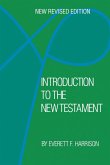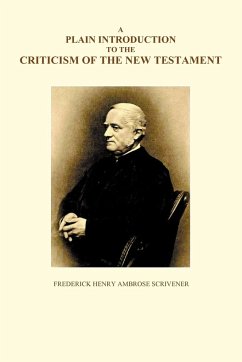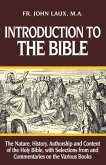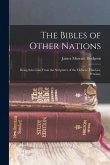Professor Bart D. Ehrman (Dr., Dr., UNC Chapel Hill)
A Brief Introduction to the New Testament
Professor Bart D. Ehrman (Dr., Dr., UNC Chapel Hill)
A Brief Introduction to the New Testament
- Broschiertes Buch
Andere Kunden interessierten sich auch für
![Introduction to the New Testament Introduction to the New Testament]() Everett F. HarrisonIntroduction to the New Testament44,99 €
Everett F. HarrisonIntroduction to the New Testament44,99 €![A Plain Introduction to the Criticism of the New Testament, Volumes I and II A Plain Introduction to the Criticism of the New Testament, Volumes I and II]() Frederick ScrivenerA Plain Introduction to the Criticism of the New Testament, Volumes I and II40,99 €
Frederick ScrivenerA Plain Introduction to the Criticism of the New Testament, Volumes I and II40,99 €![A Plain Introduction To The Criticism Of The New Testament For The Use Of Biblical Students (Volume I) A Plain Introduction To The Criticism Of The New Testament For The Use Of Biblical Students (Volume I)]() Frederick Henry Ambrose ScrivenerA Plain Introduction To The Criticism Of The New Testament For The Use Of Biblical Students (Volume I)31,99 €
Frederick Henry Ambrose ScrivenerA Plain Introduction To The Criticism Of The New Testament For The Use Of Biblical Students (Volume I)31,99 €![The Japanese Translation of the Bible: Meeting to Celebrate Its Completion, February 3rd, 1888 .. The Japanese Translation of the Bible: Meeting to Celebrate Its Completion, February 3rd, 1888 ..]() AnonymousThe Japanese Translation of the Bible: Meeting to Celebrate Its Completion, February 3rd, 1888 ..16,99 €
AnonymousThe Japanese Translation of the Bible: Meeting to Celebrate Its Completion, February 3rd, 1888 ..16,99 €![Introduction to the Books of the New Testament Introduction to the Books of the New Testament]() Allen Willoughby CharlesIntroduction to the Books of the New Testament26,99 €
Allen Willoughby CharlesIntroduction to the Books of the New Testament26,99 €![Introduction to the Bible Introduction to the Bible]() John LauxIntroduction to the Bible24,99 €
John LauxIntroduction to the Bible24,99 €![The Bibles of Other Nations: Being Selections From the Scriptures of the Chinese, Hindoos, Persians, The Bibles of Other Nations: Being Selections From the Scriptures of the Chinese, Hindoos, Persians,]() James Muscutt HodgsonThe Bibles of Other Nations: Being Selections From the Scriptures of the Chinese, Hindoos, Persians,25,99 €
James Muscutt HodgsonThe Bibles of Other Nations: Being Selections From the Scriptures of the Chinese, Hindoos, Persians,25,99 €-
-
-
Produktdetails
- Verlag: Oxford University Press Inc
- 5 Revised edition
- Seitenzahl: 432
- Erscheinungstermin: 13. Dezember 2021
- Englisch
- Abmessung: 234mm x 192mm x 18mm
- Gewicht: 754g
- ISBN-13: 9780190089528
- ISBN-10: 0190089520
- Artikelnr.: 62480306
Hinweis: Dieser Artikel kann nur an eine deutsche Lieferadresse ausgeliefert werden.
- Herstellerkennzeichnung
- Libri GmbH
- Europaallee 1
- 36244 Bad Hersfeld
- gpsr@libri.de
Bart D. Ehrman is the James A. Gray Distinguished Professor of Religious Studies at the University of North Carolina at Chapel Hill. He has written or edited more than thirty books, including six New York Times best sellers. His publications include The New Testament, Seventh Edition (2019), The Bible, Second Edition (2017), and After the New Testament, Second Edition (2014), all published by Oxford University Press.
* Each chaper ends with Questions to Ponder and Debate, Suggestions for
Further Reading, and Key Terms.
* Maps, Time Lines, and Diagrams
* Boxes
* Preface for Instructors
* Acknowledgments
* Notes on Suggestions for Further Reading
* Credits
* Master Time Line
* Introduction
* 1. What is the New Testament and Why Should We Care?
* WHAT TO EXPECT IN THIS CHAPTER
* Why Study the New Testament?
* Other Early Christian Writings
* The Development of the Christian Canon
* Implications for Our Study
* Do We Actually Have the Original New Testament
* IMPORTANT TAKEAWAYS: The Intriguing Diversity of the New Testament
* EXCURSUS 1: The Historian and the Believer
* PHOTO ESSAY 1: Ancient Manuscripts of the New Testament
* 2. The Greco-Roman World of Early Christianity
* WHAT TO EXPECT IN THIS CHAPTER
* The Problem of Beginnings
* One Remarkable Life
* The Environment of the New Testament: Religions in the Greco-Roman
World
* IMPORTANT TAKEAWAYS: The World of Early Christianity
* 3. The Jewish World of Early Christianity
* WHAT TO EXPECT IN THIS CHAPTER
* Monotheism: The Belief in the One True God
* The Covenant: Israel's Pact with Its God
* The Law: Israel's Covenantal Obligations
* Temple and Synagogue: Israel's Places of Worship
* Forms of Early Judaism
* Political Crises in the Jewish Homeland and Their Ramifications
* The Formation of Jewish Groups
* The Jewish Context for the Traditions About Jesus
* Jewish Apocalypticism
* IMPORTANT TAKEAWAYS: The World of Early Judaism
* 4. The Traditions of Jesus in Their Greco-Roman Context
* WHAT TO EXPECT IN THIS CHAPTER
* Oral Traditions Behind the Gospels
* The Gospels as Biographies of Jesus
* IMPORTANT TAKEAWAYS: The Traditions of Jesus
* Some Additional Reflections: The Authors of the Gospels
* 5. Jesus, the Suffering Son of God: The Gospel According to Mark
* WHAT TO EXPECT IN THIS CHAPTER
* The Synoptic Problem
* Mark, Our Earliest Gospel
* The Beginning of the Gospel: Jesus the Messiah, the Son of God Who
Fulfills Scripture
* Jesus, the Authoritative Son of God
* Jesus, the Opposed Son of God
* Jesus, the Misunderstood Son of God
* Jesus, the Acknowledged Son of God
* Jesus, the Suffering Son of God
* Jesus, the Crucified Son of God
* Jesus, the Vindicated Son of God
* Conclusion: Mark and his Readers
* IMPORTANT TAKEAWAYS: The Gospel of Mark
* 6. Jesus, the Jewish Messiah: The Gospel According to Matthew
* WHAT TO EXPECT IN THIS CHAPTER
* A Redactional Approach to Matthew
* The Importance of Beginnings: Jesus, the Jewish Messiah in
Fulfillment of the Jewish Scriptures
* The Portrayal of Jesus in Matthew: The Sermon on the Mount as a
Springboard
* Jesus Rejected by the Jewish Leaders
* Matthew and His Readers
* IMPORTANT TAKEAWAYS: The Gospel of Matthew
* 7. Jesus, the Rejected Prophet: The Gospel According to Luke
* WHAT TO EXPECT IN THIS CHAPTER
* A Comparative Overview of the Gospel
* The Preface to Luke's Gospel
* Luke's Birth Narrative in Comparative Perspective
* From Jew to Gentile: Luke's Portrayal of Jesus, the Rejected Prophet
* Luke's Distinctive Emphases throughout His Gospel
* Conclusion: Luke in Comparative Perspective
* IMPORTANT TAKEAWAYS: The Gospel of Luke
* 8. Jesus, the Man Sent from Heaven: The Gospel According to John
* WHAT TO EXPECT IN THIS CHAPTER
* The Gospel of John from the Perspective of Genre Criticism
* The Gospel of John from a Comparative Perspective
* The Gospel of John from a Redactional Perspective
* The Author of the Fourth Gospel
* IMPORTANT TAKEAWAYS: Historical Methods for Studying the New
Testament
* 9. The Life of Jesus and Its Aftermath
* WHAT TO EXPECT IN THIS CHAPTER
* Problems with Sources
* Using Our Sources
* Jesus in His Apocalyptic Context
* The Beginning and End as Keys to the Middle
* The Apocalyptic Teachings of Jesus
* The Apocalyptic Deeds of Jesus
* The Apocalyptic Death of Jesus
* IMPORTANT TAKEAWAYS: Jesus, the Apocalyptic Prophet
* Jesus's Resurrection from an Apocalyptic Perspective
* Jesus's Death in Light of the Scriptures
* Different Understandings of Jesus
* IMPORTANT TAKEAWAYS: From Jesus to the Gospels
* PHOTO ESSAY 2: The Material World of Jesus and the Gospels
* 10. Luke's Second Volume: The Book of Acts
* WHAT TO EXPECT IN THIS CHAPTER
* The Genre of Acts and Its Significance
* The Thematic Approach to Acts
* From Gospel to Acts: The Opening Transition
* Themes in the Speeches in Acts
* Conclusion: The Author and His Themes in Context
* IMPORTANT TAKEAWAYS: The Book of Acts
* EXCURSUS 2: Methods of Ideological Criticism
* 11. Paul the Apostle: The Man and His Mission
* WHAT TO EXPECT IN THIS CHAPTER
* The Story of Paul: Methodological Difficulties
* The Life of Paul
* IMPORTANT TAKEAWAYS: Paul and His Mission
* 12. Paul and His Apostolic Mission: 1 Thessalonians as a Test Case
* WHAT TO EXPECT IN THIS CHAPTER
* The Founding of the Church in Thessalonica
* The Beginnings of the Thessalonian Church: A Sociohistorical
Perspective
* The Church at Thessalonica after Paul's Departure
* Conclusion: Paul the Apostle xxx
* IMPORTANT TAKEAWAYS: 1 Thessalonians
* 13. Paul and the Crises of His Churches: The Corinthian
Correspondence
* WHAT TO EXPECT IN THIS CHAPTER
* 1 Corinthians
* IMPORTANT TAKEAWAYS: 1 Corinthians
* 2 Corinthians
* IMPORTANT TAKEAWAYS: 2 Corinthians
*
* 14. Paul and the Crises of His Churches: Galatians, Philippians, and
Philemon
* WHAT TO EXPECT IN THIS CHAPTER
* Galatians
* IMPORTANT TAKEAWAYS: Galatians
* Philippians
* IMPORTANT TAKEAWAYS: Philippians
* Philemon
* IMPORTANT TAKEAWAYS: Philemon
* 15. The Gospel According to Paul: The Letter to the Romans
* WHAT TO EXPECT IN THIS CHAPTER
* The Occasion and Purpose of the Letter
* The Theme of the Epistle
* Pauline Models for Salvation
* The Flow of Paul's Argument
* Conclusion: Paul and the Romans
* IMPORTANT TAKEAWAYS: Romans
* PHOTO ESSAY 3: The Cities and Roads of Paul
* 16. In the Wake of the Apostles: the Deutero-Pauline and Pastoral
Epistles
* WHAT TO EXPECT IN THIS CHAPTER
* Pseudonymity in the Ancient World
* The Deutero-Pauline Epistles
* IMPORTANT TAKEAWAYS: The Deutero-Pauline Epistles
* The Pastoral Epistles
* The Historical Situation and Authorship of the Pastoral Epistles
* Women in Paul's Church and Later
* Paul's View of Women in the Church
* Women in the Aftermath of Paul
* IMPORTANT TAKEAWAYS: The Pastoral Epistles
* EXCURSUS 3: Ideologies of Gender in the Bible
* 17. Christian Conflicts with Jews and Pagans: Hebrews and 1 Peter
* WHAT TO EXPECT IN THIS CHAPTER
* Christians and Jews
* Early Christian Self-Definition
* Continuity and Superiority: Epistle to the Hebrews
* IMPORTANT TAKEAWAYS: Hebrews
* Christians and Pagans
* Christians in a Hostile World: The Letter of 1 Peter
* IMPORTANT TAKEAWAYS: 1 Peter
*
* 18. Christian Interactions with Christians: James, 2 Peter, Jude, and
the Johannine Epistles
* WHAT TO EXPECT IN THIS CHAPTER
* Christian Interactions with Christians
* The Epistle of James
* Jude
* 2 Peter
* The Johannine Epistles
* Understanding the Johannine Epistles
* Reflections on the Contextual Method for Understanding the Johannine
Epistles
* Conflicts within the Early Christian Communities
* IMPORTANT TAKEAWAYS
* EXCURSUS 4: The Digital Bible
* 19. Christians and the Cosmos: The Book of Revelation
* WHAT TO EXPECT IN THIS CHAPTER
* The Content and Structure of the Book of Revelation
* The Book of Revelation from a Historical Perspective xxx
* Apocalyptic Worldviews and the Apocalypse Genre xxx
* The Revelation of John in Historical Context xxx
* IMPORTANT TAKEAWAYS: The Book of Revelation xxx
* Glossary
* Index
Further Reading, and Key Terms.
* Maps, Time Lines, and Diagrams
* Boxes
* Preface for Instructors
* Acknowledgments
* Notes on Suggestions for Further Reading
* Credits
* Master Time Line
* Introduction
* 1. What is the New Testament and Why Should We Care?
* WHAT TO EXPECT IN THIS CHAPTER
* Why Study the New Testament?
* Other Early Christian Writings
* The Development of the Christian Canon
* Implications for Our Study
* Do We Actually Have the Original New Testament
* IMPORTANT TAKEAWAYS: The Intriguing Diversity of the New Testament
* EXCURSUS 1: The Historian and the Believer
* PHOTO ESSAY 1: Ancient Manuscripts of the New Testament
* 2. The Greco-Roman World of Early Christianity
* WHAT TO EXPECT IN THIS CHAPTER
* The Problem of Beginnings
* One Remarkable Life
* The Environment of the New Testament: Religions in the Greco-Roman
World
* IMPORTANT TAKEAWAYS: The World of Early Christianity
* 3. The Jewish World of Early Christianity
* WHAT TO EXPECT IN THIS CHAPTER
* Monotheism: The Belief in the One True God
* The Covenant: Israel's Pact with Its God
* The Law: Israel's Covenantal Obligations
* Temple and Synagogue: Israel's Places of Worship
* Forms of Early Judaism
* Political Crises in the Jewish Homeland and Their Ramifications
* The Formation of Jewish Groups
* The Jewish Context for the Traditions About Jesus
* Jewish Apocalypticism
* IMPORTANT TAKEAWAYS: The World of Early Judaism
* 4. The Traditions of Jesus in Their Greco-Roman Context
* WHAT TO EXPECT IN THIS CHAPTER
* Oral Traditions Behind the Gospels
* The Gospels as Biographies of Jesus
* IMPORTANT TAKEAWAYS: The Traditions of Jesus
* Some Additional Reflections: The Authors of the Gospels
* 5. Jesus, the Suffering Son of God: The Gospel According to Mark
* WHAT TO EXPECT IN THIS CHAPTER
* The Synoptic Problem
* Mark, Our Earliest Gospel
* The Beginning of the Gospel: Jesus the Messiah, the Son of God Who
Fulfills Scripture
* Jesus, the Authoritative Son of God
* Jesus, the Opposed Son of God
* Jesus, the Misunderstood Son of God
* Jesus, the Acknowledged Son of God
* Jesus, the Suffering Son of God
* Jesus, the Crucified Son of God
* Jesus, the Vindicated Son of God
* Conclusion: Mark and his Readers
* IMPORTANT TAKEAWAYS: The Gospel of Mark
* 6. Jesus, the Jewish Messiah: The Gospel According to Matthew
* WHAT TO EXPECT IN THIS CHAPTER
* A Redactional Approach to Matthew
* The Importance of Beginnings: Jesus, the Jewish Messiah in
Fulfillment of the Jewish Scriptures
* The Portrayal of Jesus in Matthew: The Sermon on the Mount as a
Springboard
* Jesus Rejected by the Jewish Leaders
* Matthew and His Readers
* IMPORTANT TAKEAWAYS: The Gospel of Matthew
* 7. Jesus, the Rejected Prophet: The Gospel According to Luke
* WHAT TO EXPECT IN THIS CHAPTER
* A Comparative Overview of the Gospel
* The Preface to Luke's Gospel
* Luke's Birth Narrative in Comparative Perspective
* From Jew to Gentile: Luke's Portrayal of Jesus, the Rejected Prophet
* Luke's Distinctive Emphases throughout His Gospel
* Conclusion: Luke in Comparative Perspective
* IMPORTANT TAKEAWAYS: The Gospel of Luke
* 8. Jesus, the Man Sent from Heaven: The Gospel According to John
* WHAT TO EXPECT IN THIS CHAPTER
* The Gospel of John from the Perspective of Genre Criticism
* The Gospel of John from a Comparative Perspective
* The Gospel of John from a Redactional Perspective
* The Author of the Fourth Gospel
* IMPORTANT TAKEAWAYS: Historical Methods for Studying the New
Testament
* 9. The Life of Jesus and Its Aftermath
* WHAT TO EXPECT IN THIS CHAPTER
* Problems with Sources
* Using Our Sources
* Jesus in His Apocalyptic Context
* The Beginning and End as Keys to the Middle
* The Apocalyptic Teachings of Jesus
* The Apocalyptic Deeds of Jesus
* The Apocalyptic Death of Jesus
* IMPORTANT TAKEAWAYS: Jesus, the Apocalyptic Prophet
* Jesus's Resurrection from an Apocalyptic Perspective
* Jesus's Death in Light of the Scriptures
* Different Understandings of Jesus
* IMPORTANT TAKEAWAYS: From Jesus to the Gospels
* PHOTO ESSAY 2: The Material World of Jesus and the Gospels
* 10. Luke's Second Volume: The Book of Acts
* WHAT TO EXPECT IN THIS CHAPTER
* The Genre of Acts and Its Significance
* The Thematic Approach to Acts
* From Gospel to Acts: The Opening Transition
* Themes in the Speeches in Acts
* Conclusion: The Author and His Themes in Context
* IMPORTANT TAKEAWAYS: The Book of Acts
* EXCURSUS 2: Methods of Ideological Criticism
* 11. Paul the Apostle: The Man and His Mission
* WHAT TO EXPECT IN THIS CHAPTER
* The Story of Paul: Methodological Difficulties
* The Life of Paul
* IMPORTANT TAKEAWAYS: Paul and His Mission
* 12. Paul and His Apostolic Mission: 1 Thessalonians as a Test Case
* WHAT TO EXPECT IN THIS CHAPTER
* The Founding of the Church in Thessalonica
* The Beginnings of the Thessalonian Church: A Sociohistorical
Perspective
* The Church at Thessalonica after Paul's Departure
* Conclusion: Paul the Apostle xxx
* IMPORTANT TAKEAWAYS: 1 Thessalonians
* 13. Paul and the Crises of His Churches: The Corinthian
Correspondence
* WHAT TO EXPECT IN THIS CHAPTER
* 1 Corinthians
* IMPORTANT TAKEAWAYS: 1 Corinthians
* 2 Corinthians
* IMPORTANT TAKEAWAYS: 2 Corinthians
*
* 14. Paul and the Crises of His Churches: Galatians, Philippians, and
Philemon
* WHAT TO EXPECT IN THIS CHAPTER
* Galatians
* IMPORTANT TAKEAWAYS: Galatians
* Philippians
* IMPORTANT TAKEAWAYS: Philippians
* Philemon
* IMPORTANT TAKEAWAYS: Philemon
* 15. The Gospel According to Paul: The Letter to the Romans
* WHAT TO EXPECT IN THIS CHAPTER
* The Occasion and Purpose of the Letter
* The Theme of the Epistle
* Pauline Models for Salvation
* The Flow of Paul's Argument
* Conclusion: Paul and the Romans
* IMPORTANT TAKEAWAYS: Romans
* PHOTO ESSAY 3: The Cities and Roads of Paul
* 16. In the Wake of the Apostles: the Deutero-Pauline and Pastoral
Epistles
* WHAT TO EXPECT IN THIS CHAPTER
* Pseudonymity in the Ancient World
* The Deutero-Pauline Epistles
* IMPORTANT TAKEAWAYS: The Deutero-Pauline Epistles
* The Pastoral Epistles
* The Historical Situation and Authorship of the Pastoral Epistles
* Women in Paul's Church and Later
* Paul's View of Women in the Church
* Women in the Aftermath of Paul
* IMPORTANT TAKEAWAYS: The Pastoral Epistles
* EXCURSUS 3: Ideologies of Gender in the Bible
* 17. Christian Conflicts with Jews and Pagans: Hebrews and 1 Peter
* WHAT TO EXPECT IN THIS CHAPTER
* Christians and Jews
* Early Christian Self-Definition
* Continuity and Superiority: Epistle to the Hebrews
* IMPORTANT TAKEAWAYS: Hebrews
* Christians and Pagans
* Christians in a Hostile World: The Letter of 1 Peter
* IMPORTANT TAKEAWAYS: 1 Peter
*
* 18. Christian Interactions with Christians: James, 2 Peter, Jude, and
the Johannine Epistles
* WHAT TO EXPECT IN THIS CHAPTER
* Christian Interactions with Christians
* The Epistle of James
* Jude
* 2 Peter
* The Johannine Epistles
* Understanding the Johannine Epistles
* Reflections on the Contextual Method for Understanding the Johannine
Epistles
* Conflicts within the Early Christian Communities
* IMPORTANT TAKEAWAYS
* EXCURSUS 4: The Digital Bible
* 19. Christians and the Cosmos: The Book of Revelation
* WHAT TO EXPECT IN THIS CHAPTER
* The Content and Structure of the Book of Revelation
* The Book of Revelation from a Historical Perspective xxx
* Apocalyptic Worldviews and the Apocalypse Genre xxx
* The Revelation of John in Historical Context xxx
* IMPORTANT TAKEAWAYS: The Book of Revelation xxx
* Glossary
* Index
* Each chaper ends with Questions to Ponder and Debate, Suggestions for
Further Reading, and Key Terms.
* Maps, Time Lines, and Diagrams
* Boxes
* Preface for Instructors
* Acknowledgments
* Notes on Suggestions for Further Reading
* Credits
* Master Time Line
* Introduction
* 1. What is the New Testament and Why Should We Care?
* WHAT TO EXPECT IN THIS CHAPTER
* Why Study the New Testament?
* Other Early Christian Writings
* The Development of the Christian Canon
* Implications for Our Study
* Do We Actually Have the Original New Testament
* IMPORTANT TAKEAWAYS: The Intriguing Diversity of the New Testament
* EXCURSUS 1: The Historian and the Believer
* PHOTO ESSAY 1: Ancient Manuscripts of the New Testament
* 2. The Greco-Roman World of Early Christianity
* WHAT TO EXPECT IN THIS CHAPTER
* The Problem of Beginnings
* One Remarkable Life
* The Environment of the New Testament: Religions in the Greco-Roman
World
* IMPORTANT TAKEAWAYS: The World of Early Christianity
* 3. The Jewish World of Early Christianity
* WHAT TO EXPECT IN THIS CHAPTER
* Monotheism: The Belief in the One True God
* The Covenant: Israel's Pact with Its God
* The Law: Israel's Covenantal Obligations
* Temple and Synagogue: Israel's Places of Worship
* Forms of Early Judaism
* Political Crises in the Jewish Homeland and Their Ramifications
* The Formation of Jewish Groups
* The Jewish Context for the Traditions About Jesus
* Jewish Apocalypticism
* IMPORTANT TAKEAWAYS: The World of Early Judaism
* 4. The Traditions of Jesus in Their Greco-Roman Context
* WHAT TO EXPECT IN THIS CHAPTER
* Oral Traditions Behind the Gospels
* The Gospels as Biographies of Jesus
* IMPORTANT TAKEAWAYS: The Traditions of Jesus
* Some Additional Reflections: The Authors of the Gospels
* 5. Jesus, the Suffering Son of God: The Gospel According to Mark
* WHAT TO EXPECT IN THIS CHAPTER
* The Synoptic Problem
* Mark, Our Earliest Gospel
* The Beginning of the Gospel: Jesus the Messiah, the Son of God Who
Fulfills Scripture
* Jesus, the Authoritative Son of God
* Jesus, the Opposed Son of God
* Jesus, the Misunderstood Son of God
* Jesus, the Acknowledged Son of God
* Jesus, the Suffering Son of God
* Jesus, the Crucified Son of God
* Jesus, the Vindicated Son of God
* Conclusion: Mark and his Readers
* IMPORTANT TAKEAWAYS: The Gospel of Mark
* 6. Jesus, the Jewish Messiah: The Gospel According to Matthew
* WHAT TO EXPECT IN THIS CHAPTER
* A Redactional Approach to Matthew
* The Importance of Beginnings: Jesus, the Jewish Messiah in
Fulfillment of the Jewish Scriptures
* The Portrayal of Jesus in Matthew: The Sermon on the Mount as a
Springboard
* Jesus Rejected by the Jewish Leaders
* Matthew and His Readers
* IMPORTANT TAKEAWAYS: The Gospel of Matthew
* 7. Jesus, the Rejected Prophet: The Gospel According to Luke
* WHAT TO EXPECT IN THIS CHAPTER
* A Comparative Overview of the Gospel
* The Preface to Luke's Gospel
* Luke's Birth Narrative in Comparative Perspective
* From Jew to Gentile: Luke's Portrayal of Jesus, the Rejected Prophet
* Luke's Distinctive Emphases throughout His Gospel
* Conclusion: Luke in Comparative Perspective
* IMPORTANT TAKEAWAYS: The Gospel of Luke
* 8. Jesus, the Man Sent from Heaven: The Gospel According to John
* WHAT TO EXPECT IN THIS CHAPTER
* The Gospel of John from the Perspective of Genre Criticism
* The Gospel of John from a Comparative Perspective
* The Gospel of John from a Redactional Perspective
* The Author of the Fourth Gospel
* IMPORTANT TAKEAWAYS: Historical Methods for Studying the New
Testament
* 9. The Life of Jesus and Its Aftermath
* WHAT TO EXPECT IN THIS CHAPTER
* Problems with Sources
* Using Our Sources
* Jesus in His Apocalyptic Context
* The Beginning and End as Keys to the Middle
* The Apocalyptic Teachings of Jesus
* The Apocalyptic Deeds of Jesus
* The Apocalyptic Death of Jesus
* IMPORTANT TAKEAWAYS: Jesus, the Apocalyptic Prophet
* Jesus's Resurrection from an Apocalyptic Perspective
* Jesus's Death in Light of the Scriptures
* Different Understandings of Jesus
* IMPORTANT TAKEAWAYS: From Jesus to the Gospels
* PHOTO ESSAY 2: The Material World of Jesus and the Gospels
* 10. Luke's Second Volume: The Book of Acts
* WHAT TO EXPECT IN THIS CHAPTER
* The Genre of Acts and Its Significance
* The Thematic Approach to Acts
* From Gospel to Acts: The Opening Transition
* Themes in the Speeches in Acts
* Conclusion: The Author and His Themes in Context
* IMPORTANT TAKEAWAYS: The Book of Acts
* EXCURSUS 2: Methods of Ideological Criticism
* 11. Paul the Apostle: The Man and His Mission
* WHAT TO EXPECT IN THIS CHAPTER
* The Story of Paul: Methodological Difficulties
* The Life of Paul
* IMPORTANT TAKEAWAYS: Paul and His Mission
* 12. Paul and His Apostolic Mission: 1 Thessalonians as a Test Case
* WHAT TO EXPECT IN THIS CHAPTER
* The Founding of the Church in Thessalonica
* The Beginnings of the Thessalonian Church: A Sociohistorical
Perspective
* The Church at Thessalonica after Paul's Departure
* Conclusion: Paul the Apostle xxx
* IMPORTANT TAKEAWAYS: 1 Thessalonians
* 13. Paul and the Crises of His Churches: The Corinthian
Correspondence
* WHAT TO EXPECT IN THIS CHAPTER
* 1 Corinthians
* IMPORTANT TAKEAWAYS: 1 Corinthians
* 2 Corinthians
* IMPORTANT TAKEAWAYS: 2 Corinthians
*
* 14. Paul and the Crises of His Churches: Galatians, Philippians, and
Philemon
* WHAT TO EXPECT IN THIS CHAPTER
* Galatians
* IMPORTANT TAKEAWAYS: Galatians
* Philippians
* IMPORTANT TAKEAWAYS: Philippians
* Philemon
* IMPORTANT TAKEAWAYS: Philemon
* 15. The Gospel According to Paul: The Letter to the Romans
* WHAT TO EXPECT IN THIS CHAPTER
* The Occasion and Purpose of the Letter
* The Theme of the Epistle
* Pauline Models for Salvation
* The Flow of Paul's Argument
* Conclusion: Paul and the Romans
* IMPORTANT TAKEAWAYS: Romans
* PHOTO ESSAY 3: The Cities and Roads of Paul
* 16. In the Wake of the Apostles: the Deutero-Pauline and Pastoral
Epistles
* WHAT TO EXPECT IN THIS CHAPTER
* Pseudonymity in the Ancient World
* The Deutero-Pauline Epistles
* IMPORTANT TAKEAWAYS: The Deutero-Pauline Epistles
* The Pastoral Epistles
* The Historical Situation and Authorship of the Pastoral Epistles
* Women in Paul's Church and Later
* Paul's View of Women in the Church
* Women in the Aftermath of Paul
* IMPORTANT TAKEAWAYS: The Pastoral Epistles
* EXCURSUS 3: Ideologies of Gender in the Bible
* 17. Christian Conflicts with Jews and Pagans: Hebrews and 1 Peter
* WHAT TO EXPECT IN THIS CHAPTER
* Christians and Jews
* Early Christian Self-Definition
* Continuity and Superiority: Epistle to the Hebrews
* IMPORTANT TAKEAWAYS: Hebrews
* Christians and Pagans
* Christians in a Hostile World: The Letter of 1 Peter
* IMPORTANT TAKEAWAYS: 1 Peter
*
* 18. Christian Interactions with Christians: James, 2 Peter, Jude, and
the Johannine Epistles
* WHAT TO EXPECT IN THIS CHAPTER
* Christian Interactions with Christians
* The Epistle of James
* Jude
* 2 Peter
* The Johannine Epistles
* Understanding the Johannine Epistles
* Reflections on the Contextual Method for Understanding the Johannine
Epistles
* Conflicts within the Early Christian Communities
* IMPORTANT TAKEAWAYS
* EXCURSUS 4: The Digital Bible
* 19. Christians and the Cosmos: The Book of Revelation
* WHAT TO EXPECT IN THIS CHAPTER
* The Content and Structure of the Book of Revelation
* The Book of Revelation from a Historical Perspective xxx
* Apocalyptic Worldviews and the Apocalypse Genre xxx
* The Revelation of John in Historical Context xxx
* IMPORTANT TAKEAWAYS: The Book of Revelation xxx
* Glossary
* Index
Further Reading, and Key Terms.
* Maps, Time Lines, and Diagrams
* Boxes
* Preface for Instructors
* Acknowledgments
* Notes on Suggestions for Further Reading
* Credits
* Master Time Line
* Introduction
* 1. What is the New Testament and Why Should We Care?
* WHAT TO EXPECT IN THIS CHAPTER
* Why Study the New Testament?
* Other Early Christian Writings
* The Development of the Christian Canon
* Implications for Our Study
* Do We Actually Have the Original New Testament
* IMPORTANT TAKEAWAYS: The Intriguing Diversity of the New Testament
* EXCURSUS 1: The Historian and the Believer
* PHOTO ESSAY 1: Ancient Manuscripts of the New Testament
* 2. The Greco-Roman World of Early Christianity
* WHAT TO EXPECT IN THIS CHAPTER
* The Problem of Beginnings
* One Remarkable Life
* The Environment of the New Testament: Religions in the Greco-Roman
World
* IMPORTANT TAKEAWAYS: The World of Early Christianity
* 3. The Jewish World of Early Christianity
* WHAT TO EXPECT IN THIS CHAPTER
* Monotheism: The Belief in the One True God
* The Covenant: Israel's Pact with Its God
* The Law: Israel's Covenantal Obligations
* Temple and Synagogue: Israel's Places of Worship
* Forms of Early Judaism
* Political Crises in the Jewish Homeland and Their Ramifications
* The Formation of Jewish Groups
* The Jewish Context for the Traditions About Jesus
* Jewish Apocalypticism
* IMPORTANT TAKEAWAYS: The World of Early Judaism
* 4. The Traditions of Jesus in Their Greco-Roman Context
* WHAT TO EXPECT IN THIS CHAPTER
* Oral Traditions Behind the Gospels
* The Gospels as Biographies of Jesus
* IMPORTANT TAKEAWAYS: The Traditions of Jesus
* Some Additional Reflections: The Authors of the Gospels
* 5. Jesus, the Suffering Son of God: The Gospel According to Mark
* WHAT TO EXPECT IN THIS CHAPTER
* The Synoptic Problem
* Mark, Our Earliest Gospel
* The Beginning of the Gospel: Jesus the Messiah, the Son of God Who
Fulfills Scripture
* Jesus, the Authoritative Son of God
* Jesus, the Opposed Son of God
* Jesus, the Misunderstood Son of God
* Jesus, the Acknowledged Son of God
* Jesus, the Suffering Son of God
* Jesus, the Crucified Son of God
* Jesus, the Vindicated Son of God
* Conclusion: Mark and his Readers
* IMPORTANT TAKEAWAYS: The Gospel of Mark
* 6. Jesus, the Jewish Messiah: The Gospel According to Matthew
* WHAT TO EXPECT IN THIS CHAPTER
* A Redactional Approach to Matthew
* The Importance of Beginnings: Jesus, the Jewish Messiah in
Fulfillment of the Jewish Scriptures
* The Portrayal of Jesus in Matthew: The Sermon on the Mount as a
Springboard
* Jesus Rejected by the Jewish Leaders
* Matthew and His Readers
* IMPORTANT TAKEAWAYS: The Gospel of Matthew
* 7. Jesus, the Rejected Prophet: The Gospel According to Luke
* WHAT TO EXPECT IN THIS CHAPTER
* A Comparative Overview of the Gospel
* The Preface to Luke's Gospel
* Luke's Birth Narrative in Comparative Perspective
* From Jew to Gentile: Luke's Portrayal of Jesus, the Rejected Prophet
* Luke's Distinctive Emphases throughout His Gospel
* Conclusion: Luke in Comparative Perspective
* IMPORTANT TAKEAWAYS: The Gospel of Luke
* 8. Jesus, the Man Sent from Heaven: The Gospel According to John
* WHAT TO EXPECT IN THIS CHAPTER
* The Gospel of John from the Perspective of Genre Criticism
* The Gospel of John from a Comparative Perspective
* The Gospel of John from a Redactional Perspective
* The Author of the Fourth Gospel
* IMPORTANT TAKEAWAYS: Historical Methods for Studying the New
Testament
* 9. The Life of Jesus and Its Aftermath
* WHAT TO EXPECT IN THIS CHAPTER
* Problems with Sources
* Using Our Sources
* Jesus in His Apocalyptic Context
* The Beginning and End as Keys to the Middle
* The Apocalyptic Teachings of Jesus
* The Apocalyptic Deeds of Jesus
* The Apocalyptic Death of Jesus
* IMPORTANT TAKEAWAYS: Jesus, the Apocalyptic Prophet
* Jesus's Resurrection from an Apocalyptic Perspective
* Jesus's Death in Light of the Scriptures
* Different Understandings of Jesus
* IMPORTANT TAKEAWAYS: From Jesus to the Gospels
* PHOTO ESSAY 2: The Material World of Jesus and the Gospels
* 10. Luke's Second Volume: The Book of Acts
* WHAT TO EXPECT IN THIS CHAPTER
* The Genre of Acts and Its Significance
* The Thematic Approach to Acts
* From Gospel to Acts: The Opening Transition
* Themes in the Speeches in Acts
* Conclusion: The Author and His Themes in Context
* IMPORTANT TAKEAWAYS: The Book of Acts
* EXCURSUS 2: Methods of Ideological Criticism
* 11. Paul the Apostle: The Man and His Mission
* WHAT TO EXPECT IN THIS CHAPTER
* The Story of Paul: Methodological Difficulties
* The Life of Paul
* IMPORTANT TAKEAWAYS: Paul and His Mission
* 12. Paul and His Apostolic Mission: 1 Thessalonians as a Test Case
* WHAT TO EXPECT IN THIS CHAPTER
* The Founding of the Church in Thessalonica
* The Beginnings of the Thessalonian Church: A Sociohistorical
Perspective
* The Church at Thessalonica after Paul's Departure
* Conclusion: Paul the Apostle xxx
* IMPORTANT TAKEAWAYS: 1 Thessalonians
* 13. Paul and the Crises of His Churches: The Corinthian
Correspondence
* WHAT TO EXPECT IN THIS CHAPTER
* 1 Corinthians
* IMPORTANT TAKEAWAYS: 1 Corinthians
* 2 Corinthians
* IMPORTANT TAKEAWAYS: 2 Corinthians
*
* 14. Paul and the Crises of His Churches: Galatians, Philippians, and
Philemon
* WHAT TO EXPECT IN THIS CHAPTER
* Galatians
* IMPORTANT TAKEAWAYS: Galatians
* Philippians
* IMPORTANT TAKEAWAYS: Philippians
* Philemon
* IMPORTANT TAKEAWAYS: Philemon
* 15. The Gospel According to Paul: The Letter to the Romans
* WHAT TO EXPECT IN THIS CHAPTER
* The Occasion and Purpose of the Letter
* The Theme of the Epistle
* Pauline Models for Salvation
* The Flow of Paul's Argument
* Conclusion: Paul and the Romans
* IMPORTANT TAKEAWAYS: Romans
* PHOTO ESSAY 3: The Cities and Roads of Paul
* 16. In the Wake of the Apostles: the Deutero-Pauline and Pastoral
Epistles
* WHAT TO EXPECT IN THIS CHAPTER
* Pseudonymity in the Ancient World
* The Deutero-Pauline Epistles
* IMPORTANT TAKEAWAYS: The Deutero-Pauline Epistles
* The Pastoral Epistles
* The Historical Situation and Authorship of the Pastoral Epistles
* Women in Paul's Church and Later
* Paul's View of Women in the Church
* Women in the Aftermath of Paul
* IMPORTANT TAKEAWAYS: The Pastoral Epistles
* EXCURSUS 3: Ideologies of Gender in the Bible
* 17. Christian Conflicts with Jews and Pagans: Hebrews and 1 Peter
* WHAT TO EXPECT IN THIS CHAPTER
* Christians and Jews
* Early Christian Self-Definition
* Continuity and Superiority: Epistle to the Hebrews
* IMPORTANT TAKEAWAYS: Hebrews
* Christians and Pagans
* Christians in a Hostile World: The Letter of 1 Peter
* IMPORTANT TAKEAWAYS: 1 Peter
*
* 18. Christian Interactions with Christians: James, 2 Peter, Jude, and
the Johannine Epistles
* WHAT TO EXPECT IN THIS CHAPTER
* Christian Interactions with Christians
* The Epistle of James
* Jude
* 2 Peter
* The Johannine Epistles
* Understanding the Johannine Epistles
* Reflections on the Contextual Method for Understanding the Johannine
Epistles
* Conflicts within the Early Christian Communities
* IMPORTANT TAKEAWAYS
* EXCURSUS 4: The Digital Bible
* 19. Christians and the Cosmos: The Book of Revelation
* WHAT TO EXPECT IN THIS CHAPTER
* The Content and Structure of the Book of Revelation
* The Book of Revelation from a Historical Perspective xxx
* Apocalyptic Worldviews and the Apocalypse Genre xxx
* The Revelation of John in Historical Context xxx
* IMPORTANT TAKEAWAYS: The Book of Revelation xxx
* Glossary
* Index








